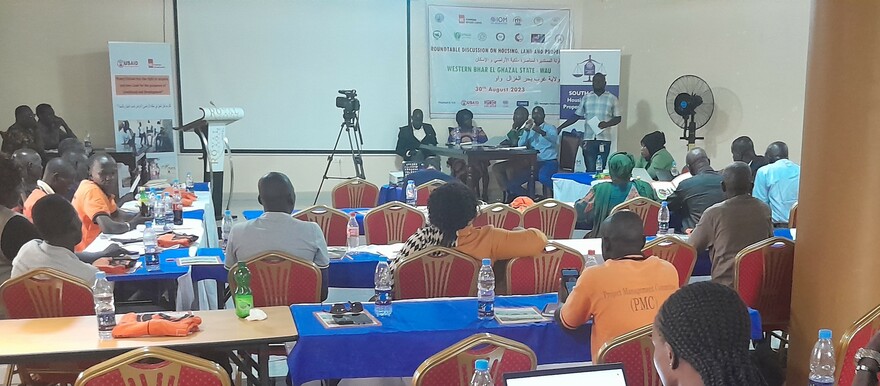Local and international organizations, in collaboration with the Western Bahr el Ghazal State government, convened a roundtable discussion on housing and land rights in Wau on Wednesday.
The event aimed to foster dialogue among stakeholders, allowing them to exchange insights into challenges and best practices pertaining to housing and land property rights.
Central to the roundtable’s agenda was identifying policy and legal gaps that obstruct the realization of Housing, Land, and Property (HLP) rights in Western Bahr el Ghazal State and across South Sudan. Participants collaboratively formulated recommendations and strategies aimed at enhancing HLP rights within the country.
Karlo Batali, Director General of the Ministry of Housing, Land, and Public Utilities in Western Bahr el Ghazal State, welcomed the initiative put forth by the UN agencies.
Batali emphasized the critical importance of having robust policies to handle land settlement, especially considering the challenges faced by the Directorate of Land Allotments due to land disputes.
“It is helping us a lot, particularly in the ministry, when it comes to the side of the survey. We are facing a lot in dealing with land disputes… My message to all participants is to take the outcome of this roundtable discussion seriously,” he said.
Anthony Akwenyu, Chief of the Complimentary Action for Resilience Building (CARB) consortium, a Norwegian Refugee Council initiative in South Sudan, highlighted the focus on proper land use through rightful processes.
“The focus of today is a discussion on experiences, challenges, and good practices of Housing, Land, and Property rights in Western Bahr el Ghazal. The second focus is the identification of policy and legal gaps and challenges that hinder the realization of Housing, Land, and Property rights,” he said.
Akwenyu stressed that disputes over land remain a major source of conflict, sometimes involving local communities. He emphasized the need for clear guidelines and policies surrounding land use to prevent disputes and tensions arising from competing land uses, such as farming and herding.
James Giir Wol, a member of the Western Bahr el Ghazal State Legislative Assembly, drew attention to the escalating land issues stemming from misunderstandings of land ownership stipulated in the national constitution. He pointed out the discrepancies between community-level and state-level governance in land usage and demarcation.
Wol also pointed out that most times, members of the community only organize themselves to apply for land demarcation and leave the bulk of the work to technicians. This approach, Wol believes, is not the rightful way of land acquisition.
“At the state level, you can find out that the laws set for land use are avoided but the land is given in the hands of individuals who hide behind the name of the community. These individuals come in large numbers and apply for land demarcation. This demarcation is often done without following the right land laws,” Wol explained.
Wol said currently, the State Ministry of Housing, Land and Utilities have no powers to go and demarcate any land, explaining, “Ministry of Housing has no power like before to set a budget and go to demarcate land and make public communication so that people come to apply.”
Anne Daniel Ali, a participant in the roundtable discussion, raised concerns about the vulnerability of women concerning land ownership in the state.
Anne pointed out that despite legal provisions granting equal land rights to both men and women, customary practices often hinder women from inheriting land from their husbands or parents.
“According to the law, men and women have equal rights to acquire land. They also have equal rights to use that land. However, in reality, you cannot see this happening. You can see that the majority of women don’t know any strategies to acquire, own and use land,” Anne explained.
The roundtable, led by the Norwegian Refugee Council (NRC) and the International Organization for Migration (IOM), brought together thirteen organizations, including the Alliance for Land Rights in South Sudan (ALRSS), a local civil society group focused on land rights in Western Bahr el Ghazal State.
Funding and support for this event were generously provided by the United States Agency for International Development (USAID), United Kingdom Aid Direct (UKAID), United Nations Central Emergency Response Fund (UNCERF), United Nations High Commissioner for Refugees (UNHCR), and Norwegian People’s Aid (NPA).




